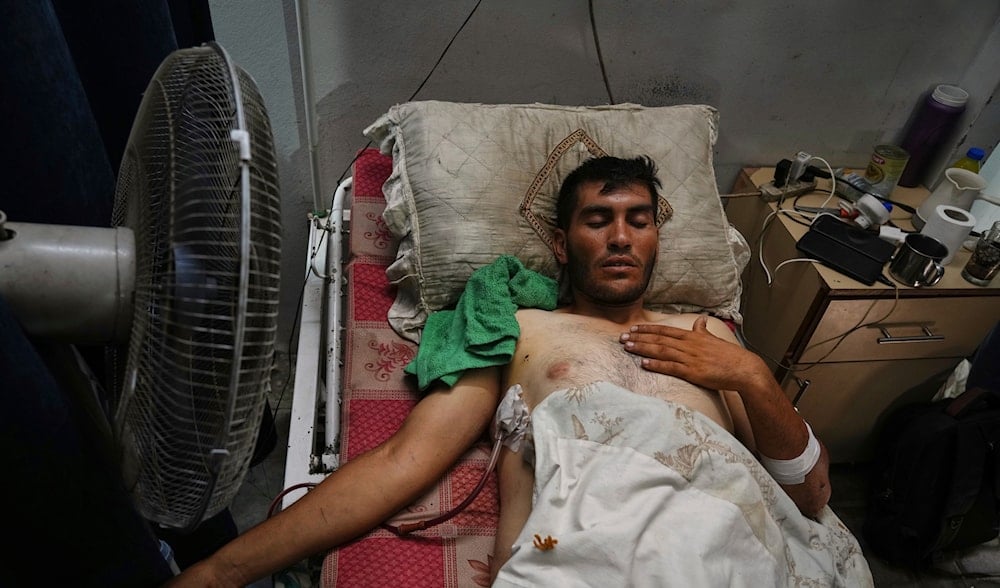Gaza crisis worsens amid surge in deadly antibiotic-resistant diseases
Gaza faces a surge in deadly antibiotic-resistant diseases amid war, making the injured more vulnerable to infection as the healthcare system collapses, supplies remain locked out, and civilian deaths rise.
-

A Palestinian patient seeks relief from the heat by sitting near a fan during a heat wave, inside a warehouse set up in the yard of Shifa Hospital in Gaza City, Wednesday, Aug. 13, 2025. (AP)
Gaza is facing a new health emergency as antibiotic-resistant diseases spread rapidly across the devastated territory, according to new research.
With medical supplies critically low, over 150,000 injuries, and widespread malnutrition, the presence of multi-drug-resistant bacteria is set to cause longer illnesses, faster disease transmission, and more deaths, experts warn.
The findings, published Tuesday in a peer-reviewed commentary in The Lancet Infectious Diseases, mark the first research since the war began in October 2023 to document the prevalence of multidrug-resistant bacteria in Gaza.
“This will mean longer and more serious illnesses and a high risk of transmission to others. It means an increased risk of death from really common infections. It means more amputations. It’s a horrible picture,” Krystel Moussally, Epidemiology Adviser to Médecins Sans Frontières, said.
Two-thirds of samples show dangerous bacteria
The study analyzed over 1,300 samples from Al-Ahli Hospital, home to one of the few remaining operational microbiology laboratories in Gaza. Two-thirds of these samples, collected over 10 months last year, tested positive for multidrug-resistant bacteria.
Bilal Irfan, a co-author of the study, called the results “particularly alarming,” stressing that the true scale of the crisis is unknown due to the destruction of most laboratories and the killing of many medical workers. “To even get a small insight into what is happening in Gaza is extremely important,” he said.
Gaza has battled high rates of drug-resistant bacteria for decades, fueled by repeated Israeli wars and the Israeli blockade imposed since 2007. But experts say the current crisis is without precedent, with the healthcare system being decimated, sanitation networks and waste disposal collapsed, and widespread hunger, making residents more vulnerable to infection.
The study, which was mainly conducted on patients who suffered traumatic injuries due to Israeli attacks, warns that the crisis will worsen unless the Israeli assault ends and the “deliberate targeting of hospitals, laboratories, and water desalination plants” stops.
Humanitarian supplies to Gaza 'not happening yet'
On Tuesday, the World Health Organization (WHO) urged “Israel” to allow the stocking of medical supplies to confront Gaza’s “catastrophic” health conditions.
“We want to stock up, and we all hear about more humanitarian supplies are allowed in – well it’s not happening yet, or it’s happening at a way too low a pace,” said Rik Peeperkorn, WHO Representative in the Palestinian territories.
Peeperkorn reported that Gaza has run out of more than half its medicines, with the WHO facing “cumbersome procedures” and outright denial of some medical products by Israeli authorities.
The representative stated that only 50% of hospitals and 38% of primary healthcare centers are currently partially functioning, while bed occupancy is at 240% in Al-Shifa Hospital and 300% in Al-Ahli Hospital. “The overall health situation remains catastrophic. Hunger and malnutrition continue to ravage Gaza,” Peeperkorn added.
Gaza famine death toll hits 235
Meanwhile, the Israeli-made famine ravages through Gaza, killing 235, including 106 children, as the humanitarian situation reaches catastrophic levels.
Under the ongoing tightened blockade, complete closure of crossings, and the Israeli occupation’s ban on the entry of food and medicine, hospitals and health centers across Gaza are facing an unprecedented crisis. More than 2.4 million civilians, including over 1.2 million children, are enduring severe hunger and malnutrition.
According to official ministry data, the fatalities include 129 adults, among them 19 women, 75 elderly individuals, and 35 men over the age of 18.
The starvation crisis is not limited to patients; medical staff themselves report symptoms of malnourishment. Aid workers say they are witnessing people “wasting away” among their teams, threatening their ability to provide care.
Beyond the immediate deaths, the long-term impacts of Gaza's starvation are severe. Children may suffer permanent health damage, while injured and sick individuals take longer to heal, overwhelming the few remaining hospitals.

 4 Min Read
4 Min Read








